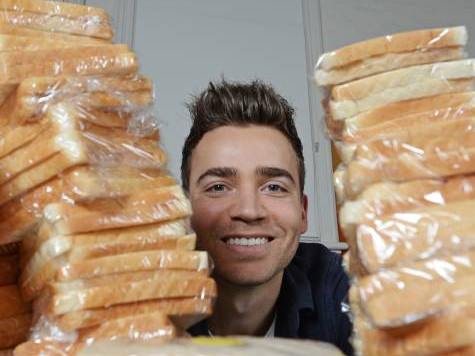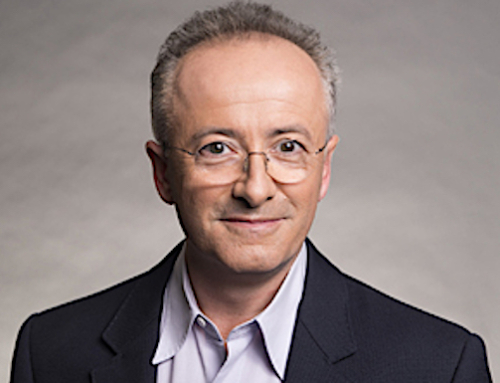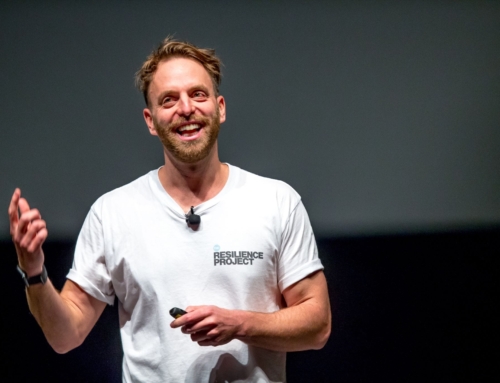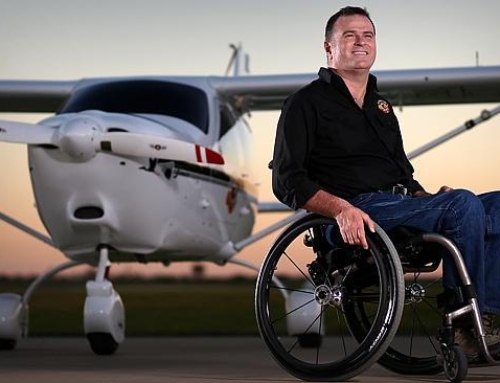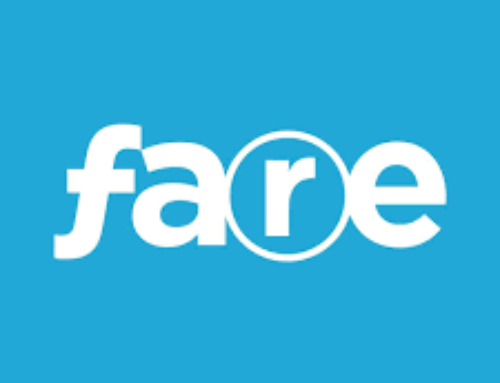You know the commercial. The one where a child is sitting at their desk, when their eyes start to droop, the teacher’s voice fades and the classroom surroundings begin to blur. The camera then cuts to advertising a breakfast cereal or children’s snack food and results of a study linking healthy eating with performance at school flash across the screen.
Despite these well-known findings, the 2015 Foodbank ‘Hunger in the Classroom’ report states that every day, three students in an average Australian classroom will go hungry.
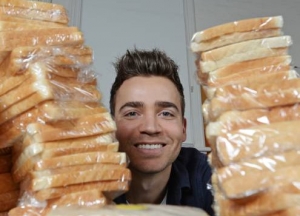
Enter Lyndon Galea, the founder of ‘Eat Up Australia’. Lyndon, born and raised in Shepparton, read an article about two local Shepparton schools where children were going hungry, and decided to ‘be the change’:
“Both of them were so close to my house and it just resonated with me really deeply. When something’s happening on your doorstep, it’s harder to do nothing. Shepparton does have a reputation for disadvantage but this did seem like a far more serious example.”
The grandson of a migrant from Malta, Lyndon is a middle child, with an older sister and younger brother. He credits his family for his awareness of social issues:
“I was really aware how lucky I was growing up and that a lot of the opportunities I had growing up such as to go to good schools…were because I was lucky enough, by pure fluke. I was aware that there were others who weren’t as lucky as me and I always wanted to contribute in some way when I could.”
Lyndon gives me some family history:
“Mum and Dad grew up in Melbourne. Dad was an apprentice panel beater, so Dad and my uncle (Mum’s brother) bought a smash repairs in Shepparton… so now they have a car repairs and a truck repairs and some earth-moving equipment. My dad has done incredibly well… and my mum as well , to build up a business from nothing ultimately. He’s a real inspiration, that was in his generation, he did that himself…he for sure wouldn’t have been able to do it without my mum.”
This family business had a substantial impact on the community and now employs nearly 100 people around the country.
Lyndon took inspiration from his parents when starting Eat Up Australia, but like any organisation, it had humble beginnings:
“I just thought, ‘If I could make them sandwiches and drop them off, that seems like a reasonably simple solution’. I was making breakfast and making toast, so I thought, ‘I’ll just keep doing this and butter some more bread and put some Vegemite and cheese on and make some sandwiches’. At first, we were just making lunches at home, using what we had in the cupboard and dropping them off.”
Lyndon, who was studying Entrepreneurship at RMIT (City Campus) has a friend Lisa McKenzie who was the head of one of the local charities:
“I gave her a call and said ‘If I took some of these lunches to the schools, would it help?’ She gave me the opportunity to be introduced to the principals and ask them if we could support in that way. We asked the schools, ‘We just want to help out. Where is that help best directed? Where do you need it?’, and they suggested lunch . They said how, before that, it would be the teachers who were making the kids lunch every day or giving their own money to buy the kids lunch from the cafe across the road or even giving them their own lunch so then the teachers would go hungry. It was clear that that was where the need was.”
Lyndon says that the poverty experienced by these children is different to what most would recognise as poverty, but that the negative flow-on effects can be just as severe, in terms of physical and emotional hardship. The 2015 Foodbank ‘Hunger in the Classroom’ report also states that:
“82% of teachers say that their job is made harder when there’s a hungry child in the classroom, and it will then impact upon the other kids.Eat Up fills that gap so kids don’t have to go without, on those occasions.”
The major contributor to this kind of poverty is a pressured financial situation at home:
“With the welfare cycle payments being once a fortnight , the uptake to the lunches will drop off when a new payment’s arrived, so parents really want to feed their kids, and then just before the next payment arrives, the numbers will spike. Other times there can be absent parents, alcohol or drug issues, or people recently arrived from overseas trying to find their feet.”
The people volunteering with Eat Up do not directly associate with the students they help, out of respect for teachers and students alike:
“Teachers have the right expertise and the right sensibilities to be able to give the kids the lunches in the right manner. They often get their students to take their lunchboxes out at their desk, and it gives them a subtle insight into who hasn’t got something. They can have a quiet word and find out if they have any siblings. It’s pretty incredible how aware the teachers are of each child’s circumstance, they really really care. It’s obvious any time you meet one of those teachers how affected by it they are and how much they want to help.”
An alumni of the YGAP Spark Program for young social entrepreneurs, Lyndon admits that had he known about the sheer scale of food insecurity, he may have been too overwhelmed to begin Eat Up Australia:
“I would have thought ‘Oh gee, I can’t have any broad impact, but because I found out about these first two schools, we’d help them, then I found a couple more and we’d go there. It built up momentum that didn’t allow for me to have doubts which I’m sure would have come. I think I was lucky to be swept up in this way where it came about really quickly.”
Lisa McKenzie suggested making use of Shepparton FoodShare:
“[It’s a]big supermarket for charities, where we can source all this food for free, so we would get bread, spreads, recess items, fruit for free. There’s three major food waste charities, Foodbank, OzHarvest and Second Bite and all of them are located nationally…FoodShare is part of the Foodbank network .”
The head of Shepparton FoodShare at the time, Russell O’Halloran encouraged Lyndon to think bigger:
“[He said], ‘You could do this nationally, all the food banks are right around the country’. He was aware that the need was as well and that was the first moment that I thought beyond Shepparton let alone broader. That was the key piece.”
A certified kitchen space was found through a partnership with a local TAFE school:
“We were using that with volunteers, then teachers said ‘We’d love to get our students involved’, so apprentice chefs, people who love to cook and love to be around food, would volunteer their time and we’d get ten to fifteen students and they’d make about three hundred sandwiches in about half an hour.”
For such a simple idea, it is surprising the idea of Eat Up hadn’t already been taken:
“…that was what struck me the first time we dropped off these one hundred sandwiches and you think well, there’s one hundred lunches for kids who otherwise wouldn’t have had anything to eat.”
The generous support of volunteers and the simple business model means that the work of Eat Up can be scaled in line with the need:
“We take them to the schools fresh, but then the schools freeze them, so that gives the teachers the control and reliability of a service, in knowing what they’ve got, so the teachers identify and distribute the lunches to the kids, but it allows us to scale, so we do the model every fortnight. We only really go into TAFE an hour maximum every couple of weeks, and then in Melbourne working with OzHarvest, they help us a lot with our logistics and drop-offs pro-bono so it means only leaning on them every couple of weeks as well.”
It really is a family affair, with Lyndon’s younger brother helping out at some of the sandwich-making volunteer sessions. Lyndon’s older sister who has resided in the United Kingdom for the last five years, works in events, PR and marketing and has been a great help \in bringing to his attention similar projects that exist over there, and what they do to support themselves. Eat Up is a “product of family, friends and mates” with people helping out to make lunches for twenty nine primary schools across Shepparton, Bendigo and Melbourne. A target of fifty schools before the end of 2016 is the next milestone to reach, followed by launching interstate by the end of Term 1 2017, and partnering with another new state by the end of 2017.
“With this national view, we’re going to have to professionalise the whole operation of what we do. There’s a lot of clever social enterprises out there, so if we can introduce an element of that into our model, that’s very much going to be key into having the impact we want to.”
For people wishing to support Eat Up, there are two main ways you can help. You can volunteer:-
“Eat Up is all about relationships and collaboration, so ultimately we act as a conduit between bigger organisations to deliver this new service, and then we leverage the generous support of volunteers and people who are willing to help us, so if people want to get involved with these sandwich making sessions, that’s really key to building our output. It’s only because of our volunteers and people helping us that we can have that target of fifty schools because we know people are there to support us to get them out. People in new suburbs, new areas of Victoria or even interstate, that can band together and have a sandwich session, once a fortnight or once a month, we can get different groups rotating through there.”
– or they can assist through a business partnership:
“We want to build relationships with larger providers and food owners that can help us,with Kraft for instance…some of the big supermarkets, anyone willing to bring expertise and backing to help us get to the next level. A lot of the good conversations we’ve had have been out of getting the right introductions, so someone might have their mum or their auntie, or their dad, brother, friend of a friend, who works for one of these big companies…who might be able to connect with us and collaborate in some way to make feeding hungry kids an easier task.”
The organisation is currently run by volunteers, however Lyndon envisages making the organisation more sustainable:
“To be able to lead the growth of Eat Up and work within that, would be a dream, but likely there’s going to have to be this intervening period where I’m still putting just as much time into it, but I’ll have to balance other part-time jobs to build it up…”
Until that vision becomes a reality, Lyndon earns an income with OzHarvest: “I work part-time at OzHarvest two days a week in the van which is great and it’s certainly helped Eat Up in terms of relationships”.
The five year plan for Eat Up involves completing its national growth and perhaps replicating the model in other countries. Lyndon admits that a weakness of the organisation is that it acts as a band-aid solution to a larger issue, so he hopes to be able to add an element to the model which “focuses on the root cause or has other educational spin-offs…education is massive”.
Lyndon believes the most important determinants for ensuring the success of a start-up organisation include whether the idea is scalable and whether “it’s a cause that resonates with the wider public”. It is important to complete a feasibility study, researching what other organisations already exist and how they structure themselves, as well as finding your passion and “marrying that passion up with something that can have a tangible outcome”. Instead of limiting yourself, dream big, have persistence and tenacity, “get other people involved, communicate goals, and try to draw lessons from everywhere”.
Eat Up Australia continues to grow and its success is not surprising when a young entrepreneur like Lyndon Galea is at the helm. In his own words:
“I really wanted to prove that Eat Up could grow on a national level and hopefully as well that I had the capacity to be able to lead that growth. I was really passionate about making sure I could see it through and achieve at the level that we needed to, to help these kids…to break the cycle of disadvantage.”
To find out how you can support Eat Up Australia, please e-mail [email protected] or visit www.eatup.org.au

